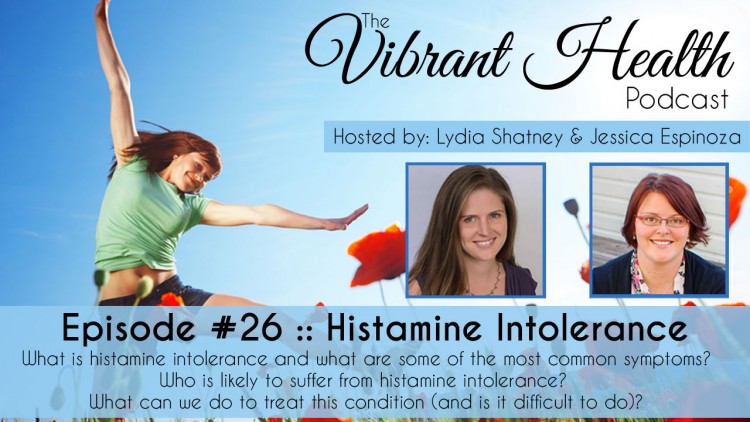FTC Disclosure: Delicious Obsessions may receive comissions from purchases made through links in this article. As an Amazon Associate I earn from qualifying purchases.Read our full terms and conditions here.

In today’s episode, Lydia and I talk about histamine intolerance, which is an issue that is starting to become more common. We explain what histamine intolerance is, as well as share some of the most common symptoms of histamine intolerance.
We also cover who is more likely to suffer from histamine issues, as well as how to treat this condition so that you don’t have to suffer from the symptoms you may have been experiencing.
Missed previous episodes? You can find them all here.
Links From This Week’s Episode:
- The VH Podcast, Episode 8: Can We Please Stop with the Willy Nilly Supplementation?
- The VH Podcast, Episode 10: Ascorbic Acid vs. Whole Food Vitamin C
- The VH Podcast, Episode 12: What You’ve Never Been Told About Your Metabolism
- The VH Podcast, Episode 13: How to Heal Eczema
- The VH Podcast, Episode 17: Magnesium 101
- The VH Podcast, Episode 23: Methylation 101
- Miraculous Magnesium and DIY Magnesium Oil
- Need an Energy Boost? Drink This Revitalizing Summer Tonic
- Nourishing Our Bodies with Herbs
- 4 DIY Adaptogenic Herbal Tea Blends
- 52 Weeks of Bad A** Bacteria – Week 17 – Fermented Nettle Tea
- Histamine Intolerance: What You Need to Know
- Probiotics and Histamine Production?
- Is Your Body Antihistamines?
- Histamine Intolerance, MTHFR and Methylation
- Health Assessment with Lydia
- Hair Analysis with Lydia
- Information about HTMA and Minerals
- How to Create a Game Plan to Keep Your Whole Family Healthy
Listen to The Vibrant Health Podcast :: Episode 26
Read The Vibrant Health Podcast Show Notes :: Episode 26
Histamine Intolerance Show Notes
Make sure you check out the Links from the Episode for lots more information on today’s topic.
What is histamine intolerance?
Histamine is an amine that is produced as part of an immune response – it also performs several key functions in the body.
First off, we need just enough histamine in the body to help us with blood flow, help us digest our food, move our bowels (performing several functions in the bowel actually) and even to help us with attention because it acts as a neurotransmitter or chemical messenger that carries signals to nerves. When we have the right amount, we can do these things optimally, but when we have too much, we become intolerant to it and have reactions.
Maybe you have heard the histamine bucket analogy: “If we have too much in our histamine bucket, it overflows and spills out.”
Basically, numerous factors can cause our histamine bucket to fill up so it’s important to reduce the inflammatory offenses that affect this.
For Lydia, she has more reactions to high histamine foods when she have a ton of stress in her life along with environmental allergy exposures (for example, like dust or mildew). She also knows that she has to support her adrenals and keep her magnesium levels in a good place or she reacts much more strongly.
What are some of the symptoms of HI?
Common symptoms of histamine intolerance include:
- Headaches/migraines (especially around menstruation)
- Difficulty falling asleep, easy arousal
- Hypertension
- Vertigo or dizziness
- Arrhythmia, or accelerated heart rate
- Difficulty regulating body temperature
- Anxiety
- Nausea, vomiting
- Abdominal cramps
- Diarrhea
- Flushing
- Nasal congestion, sneezing, difficulty breathing
- Abnormal menstrual cycle
- Hives/urticarial
- Eczema
- Low blood pressure
- Fatigue
- Tissue swelling
What Causes High Histamine Levels?
- Calcium and/or magnesium deficiency
- Copper deficiency (needed to synthesize DAO enzyme)
- Poor methylation status and genetic susceptibility
- Nutrient deficiency, especially key nutrients for proper methylation such as: B12, folate, B6, B2, B1, Zn, Copper, Whole Food C
- Allergies (IgE reactions)
- Bacterial overgrowth (SIBO)
- Leaky gut
- GI bleeding
- Fermented alcohol like wine, champagne, and beer
- Diamine Oxidase (DAO) deficiency
- Histamine-rich foods (aged foods, leftovers, chocolate, citrus, tomatoes – fermented foods, long-cooked bone broth and many more)
- Hormonal Excess – Estrogen namely
What can we do about treating HI?
There are a lot of things we can do to support ourselves for this.
- Clean Diet
- Reduce Stress
- Support the adrenals
- Reduce overall inflammation in the body
- Minerals – Magnesium, calcium, copper, all play into histamine issues
- Nettles tea – Nettles are high in magnesium, calcium, potassium, boron (about 3 mg a quart!), chromium, manganese. Nettles are a natural antihistamine; they help balance blood sugar and blood pressure, and they are amazing for adrenals, liver and kidneys.
- When symptomatic reduce higher histamine foods
- Enzymes
- Genetic Testing
Further Testing
We love HTMA for getting deeper into issues with histamine. One reason is because low magnesium, low copper and weak adrenals contribute to issues with histamine. Folks in a fast oxidizer pattern tend to have a bit more noticeable struggles with histamine and often removing the worst offenders, food-wise, can make a dramatic difference in their health complaints.
Some people may get even more information from their genetic data; there are several SNPs DAO – refer to our podcast with Jessica Bischoff.
